
16 minute read
Change Agent
For ABPNN grad Megan Reynolds, health care and humanitarian efforts work in tandem to support her quest to make an impact on the world
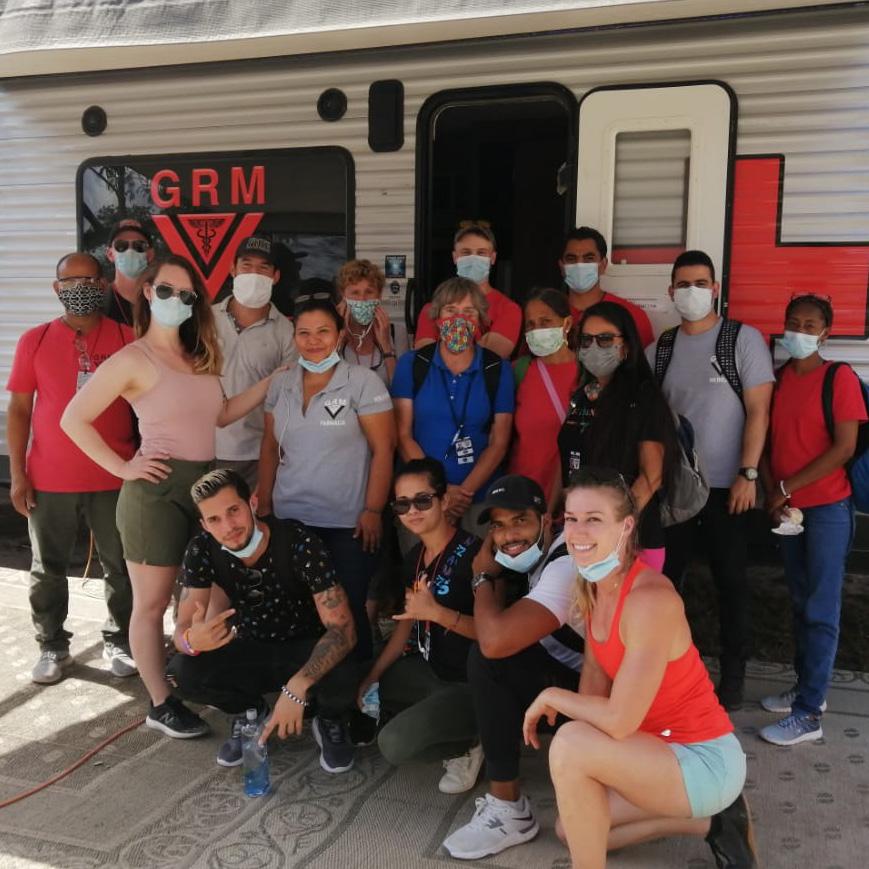
From an early age, Megan Reynolds ’19N has had a passion for helping people.
“Humanitarian work has always been integral in my drive to provide health care. My earliest memory as a kid was wanting to respond to the genocide in Sudan,” said Reynolds, a nurse in the Burn Trauma Intensive Care Unit at Strong Memorial Hospital who was honored by the School of Nursing in 2020 with its Humanitarian Award. “I’ve always known that I was going to end up doing this work in some capacity.”
To maximize the impact of her work, Reynolds realized that she had to gain actual experience in health care first, which led her to the UR School of Nursing’s Accelerated Bachelor’s Program for Non-Nurses (ABPNN).
“I think there are a lot of people who may have good intentions with humanitarian work, but aren't bringing anything useful,” she said. “I knew I needed to bring tangible change.”
At the School of Nursing, Reynolds didn’t just focus on academics, but immediately went about putting her knowledge into action. In addition to her work with programs focusing on student wellness and student advocacy and her role as a mentor for the Center for Academic and Professional Success (CAPS), Reynolds redefined the school's role in UR Street Outreach, a student-run initiative that improves accessibility to uninsured and underserved adults in Rochester.
Originally established by the University of Rochester School of Medicine and Dentistry (SMD), Street Outreach provides free health care services to the unsheltered homeless population. The organization operates out of the emergency shelter advocacy group Rochester Emergency Action Committee for the Homeless (REACH) House, St. Joseph’s Neighborhood Center, and House of Mercy.
As a volunteer, Reynolds was impressed with Street Outreach’s mission and execution of weekly trips despite the grueling academic schedules the SMD students faced. However, the group struggled to staff three shifts a week. That’s when Reynolds saw a need for nurses.
“We were building relationships, educating, and providing trauma-informed care—that’s what UR Nursing students excel at,” said Reynolds.
Since UR Nursing’s role in Street Outreach was redefined, the group has not experienced a single understaffed shift.
At her Commencement ceremony, Reynolds was honored with the Paul Burgett Nursing Student Life Award, an achievement given to a graduating student who has enriched the School of Nursing environment regarding diversity, raised awareness of different cultural issues, actively participated in improving student life, has been a positive catalyst for change, and has the potential to influence nursing practice to be inclusive of all culture.
Shortly after that, she was on to her next mission. Reynolds received a call from her friend Dan Taylor, board member of Global Response Management (GRM) Group, a non-profit that delivers emergency medical care and humanitarian relief in high-risk areas.
Taylor invited Reynolds to join GRM in providing medical care to a camp populated by over 3,000 asylum-seekers and
A year after graduating from the UR School of Nursing, Meg Reynolds ‘19N volunteered as part of a team of humanitarian workers to provide health care at a refugee camp in Matamoros, Mexico. She spent two weeks providing needed medical services to camp residents just before COVID-19 erupted throughout Mexico.
refugees in Matamoros, Mexico. Reynolds accepted and left for Mexico in early May 2020.
In 2018, the United States Department of Homeland Security enacted The Migration Protection Protocols (MPP), commonly referred to as the “Remain in Mexico” program. The protocol requires asylum seekers to stay in this camp in Mexico until their paperwork is processed by U.S. immigration courts.
Reynolds described the camp as “a patchwork system of tarps and tents on a stretch of dirt about two football fields long. Women, children, and infants were packed into these tiny filthy spaces with no health care or ability to cook and clean, and little access to food or hygienic materials of any kind.”
The camp gained access to drinkable water after GRM sent engineers to build a water filtration system that purifies water from the Rio Grande. A medical clinic established in the center of camp consisted of an RV and three semi-permanent humanitarian tents. Conditions are the very definition of low-resource medicine—sparse equipment and limited medical supplies.
In addition to members of GRM, the medical care team at the camp had three full-time physicians, two nurses, and two interpreters who ran the operation seven days a week, all of whom are Cuban and seeking asylum, as well.
Most of the cases the medical team treat are caused by malnutrition due to inaccessible resources, such as clean water, medicine, and healthy foods. Many children experience rashes from being exposed to chemicals and pollution. The camp burns plastic at all hours of the day to cook because energy-fueling resources like wood are scarce. The pollution in the air exacerbates other conditions present in many adults and puts children at risk for developing asthma.
Reynolds recalls sending a man to the hospital after he broke his elbow because the medics were unable to provide an X-ray or administer pain control. “Due to the danger in Matamoros, we cannot carry any narcotics whatsoever at any time. If cartels found out we had narcotics, they would steal all the supplies. With limited recourse medicine, you do what you can with what you have. It’s an art,” she said.
After two weeks of caring for the people in Matamoros, Reynolds returned home to Rochester.
When asked how prepared the camp was for COVID-19, which was just starting to intensify during her stay, Reynolds said, “GRM has done a fantastic job building a field hospital, a COVID-19 isolation area, and screening area.” However, according to Reynolds, a wave of the virus seemed inevitable for the camp. “It's going to be devastating because of the state these people are forced to live in.”
Despite the limited resources, dangerous conditions, and uncertainty of their citizenships, Reynolds was shocked to see how generally happy people were there. “They all help and take care of each other. I promise you that I would not be positive if I was in their shoes. Yet, they are so filled with love,” she said. “They have such a phenomenal sense of community there. We were there for Mother's Day and somehow they were able to sneak some cakes and throw a celebration for all of the mothers in the camp.“
What especially strikes Reynolds is how happy the children are. “I think you have to understand the situation they came from to understand how this is an improvement,” she said.
Reynolds said she would love to return to the camp in Mexico, but she also has other projects tugging at her attention. “I would go to the Navajo Nation if I could do anything in the world right now. They are in desperate need of critical care personnel.”
Reynolds encourages everyone to get involved with humanitarian work, especially fellow health care practitioners who can use their skills to provide medical relief.
When deciding what causes to get involved in, Reynolds offers this advice: “Listen to what evokes emotion in you and use it to educate yourself. Once you’ve researched, then offer your time. If you can’t offer time, then there's always a need for funds. If you’re not in the financial place to give money, then spread awareness.”
If interested in helping asylum seekers, Reynolds welcomes individuals to explore local organizations like Rochester Refugee and Refugees Helping Refugees, and consider donating to Global Response Management to sustain its ongoing mission.
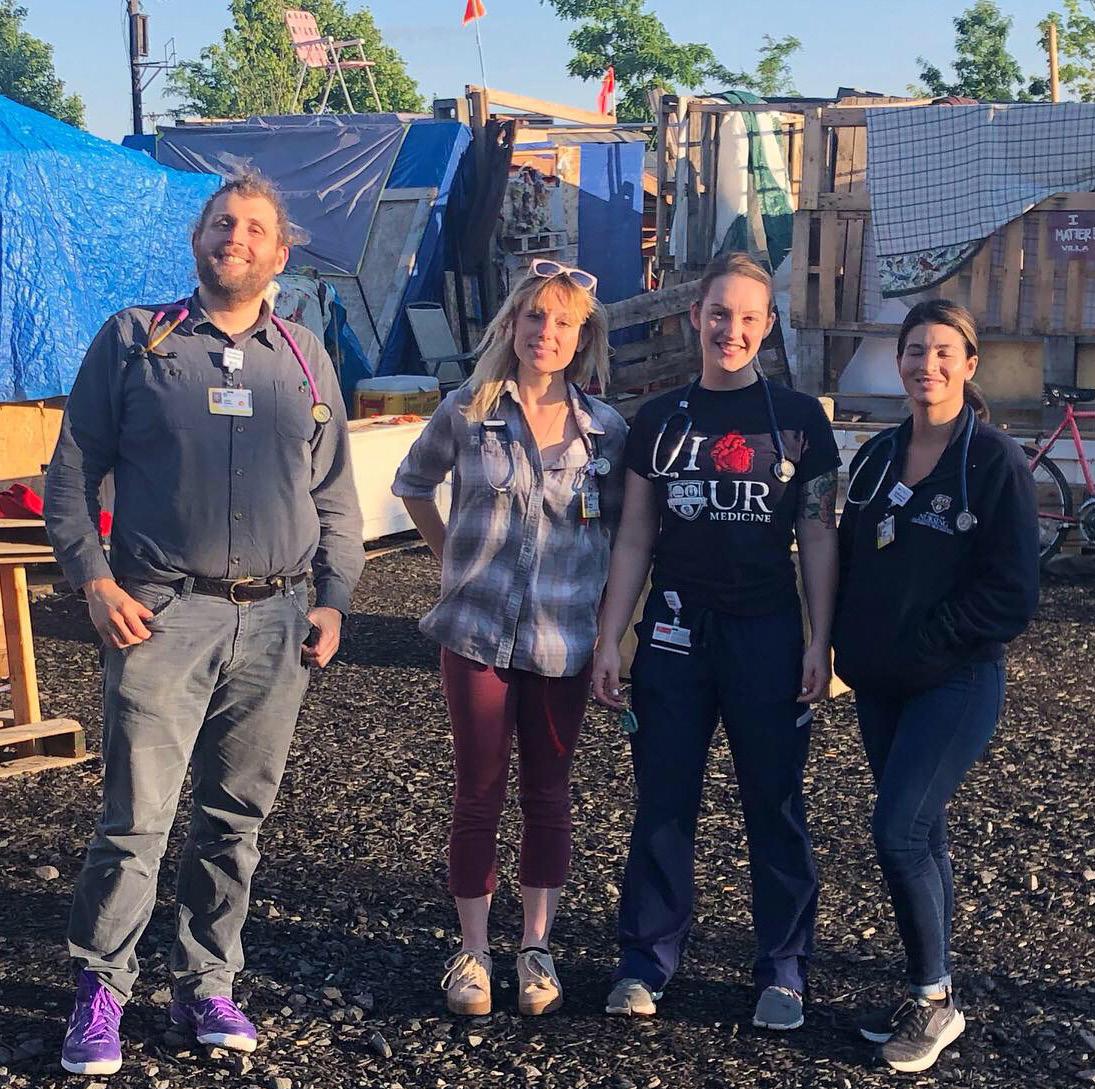
As an undergrad in the Accelerated Program for Non-Nurses, Megan Reynolds (second from right) redefined the School of Nursing's role in UR Street Outreach, a student-run initiative that provides free health care services to the unsheltered homeless population in Rochester.
Why I Traveled to Guadalajara During the Pandemic By Justin Chaize, RN, BSN
As a Mexican-American nurse, I wanted to do something to help health workers in Mexico affected by COVID-19. I read that the country’s health care system was ill-equipped to handle the pandemic, and that misinformation and a shortage of personal protective equipment (PPE) had contributed to the illness of thousands of Mexican health care workers at a rate faster than has occurred in the U.S., Italy, and China.
I wanted to see how bad things were for myself and try to offer some assistance. I began collecting and asking for donations of PPE here in Rochester. I have family in Mexico, so I was able to make online connections to health care workers there. Despite travel uncertainty, I departed for Mexico on May 10 and arrived safely in Jalisco, a western Mexican state of 8 million people. Its capital, Guadalajara, is the third largest city in Mexico, and has a population of 1.5 million. As of June 2020, Jalisco had recorded more than 2,000 cases, resulting in more than 200 deaths, though the totals were most likely higher due to lack of testing and tracking.
Upon my arrival, I quickly tried to get a sense of the political, economic, and social climate. As ordered by Jalisco’s state government, face masks are required in public, and most non-essential businesses were closed. I had traveled to Guadalajara once before, in July 2019. This time, I immediately noticed reduced traffic and bustle. However, some restaurants were seating diners, and there was still a fair amount of pedestrian activity.
I managed to confirm a contact with the secretary of health and get directions to a supply location for donations. Later in the week a doctor from the Red Cross, as well as a nurse who I met through a mutual friend, came to pick up supplies.
Jalisco has benefited or suffered (depending on one’s perspective) from strong leadership under Governor Enrique Alfaro Ramirez. Back in April, Alfaro appeared to be one of the first governors to implement a strict lockdown. Alfaro has created an economic strategy, independent of Mexico’s national plan, re-opening in phases. This is not to say everything is running smoothly. Like here in the U.S., there is confusion about which businesses can open and how to implement safety protocols. Also, like here, tensions are high with the police. Allegedly a man in Jalisco was detained by the police for not wearing a mask and later beaten and killed (and, yes, there were protests and riots). Of course, the best part of my trip was seeing family. They are doing okay for now. However, I do worry about them being out of work and those with underlying health issues. Thanks to my family in Rochester, everyone who supported me on this trip, and especially to those who donated supplies: Matté Baxendell, Wanda Martinez, and Claudia Perez.
Justin Chaize, RN, BSN, is a student in the UR School of Nursing Family Psychiatric Mental Health Nurse Practitioner program.
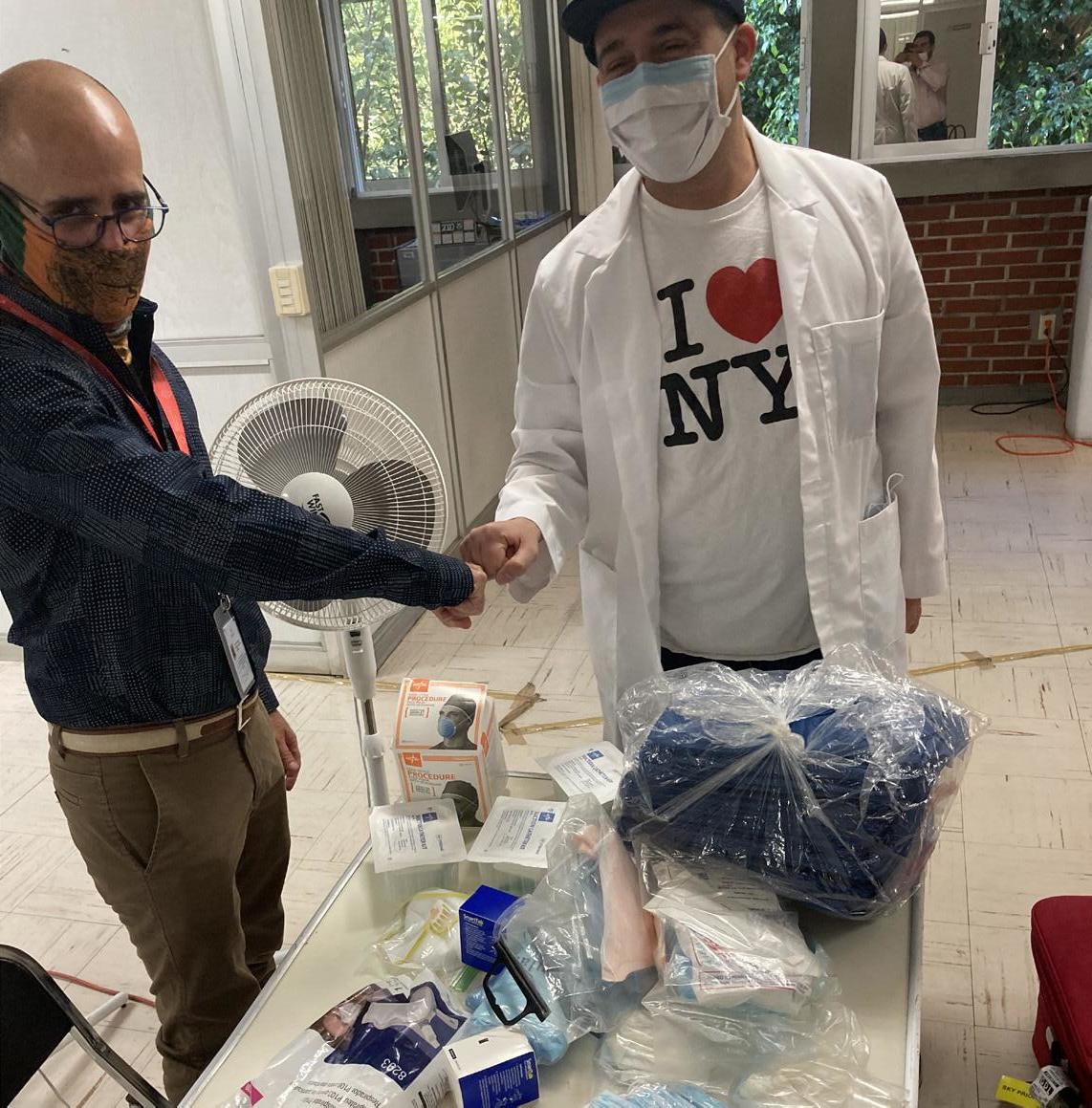
Justin Chaize (right), a Mexican-American nurse and student in the UR School of Nursing’s Family Psychiatric Mental Health Nurse Practitioner program, collected personal protective equipment in Rochester and delivered it to health care workers in Guadalajara in May.
Dean’s Diamond Circle 2020 Award Winners
Each year, the University of Rochester School of Nursing hosts the Dean’s Diamond Circle dinner, a donor recognition event, in which those that have made a lasting impact in the community are recognized. This year’s ceremony was postponed due to COVID-19, but recipients were notified of their awards. Profiles of each recipient are featured below:
Distinguished Alumnus Award LaRon E. Nelson, ’02N, ’04N (MS), ’09N (PhD)
LaRon Nelson, PhD, RN,
FNP, FNAP, FAAN, was the recipient of the Distinguished Alumnus Award for his leading efforts and significant contributions in HIV prevention within African and African diaspora communities in the United States, Canada, and Ghana.
Nelson is the inaugural associate dean for global health and equity and an Independence Foundation associate professor of nursing at Yale School of Nursing. He also oversees the Office of Global Health and the Office of Diversity, Equity, and Inclusion.
At the UR School of Nursing, Nelson was an associate professor, inaugural Harriet J. Kitzman Fellow in Health Disparities, and associate director of international research in the Center for AIDS Research.
Nelson’s ongoing work investigates reducing the intersectional stigma in public health clinics and increasing the frequency of HIV testing among sexual minority men in Ghana.
Nelson also co-chairs the HIV Prevention Trials Network 096, a 16-city community randomized trial of a multi-level intervention to reduce HIV incidence among Black sexual minority men in the south.
Nelson completed post-doctoral education with the HIV Prevention Trials Network HPTN Scholars Program. In 2017, Nelson was named a Fellow of the American Academy of Nursing and in 2015, UR School of Nursing’s Most Outstanding New Investigator. Additionally, in 2012, the Canadian government recognized him as a rising star in global health.
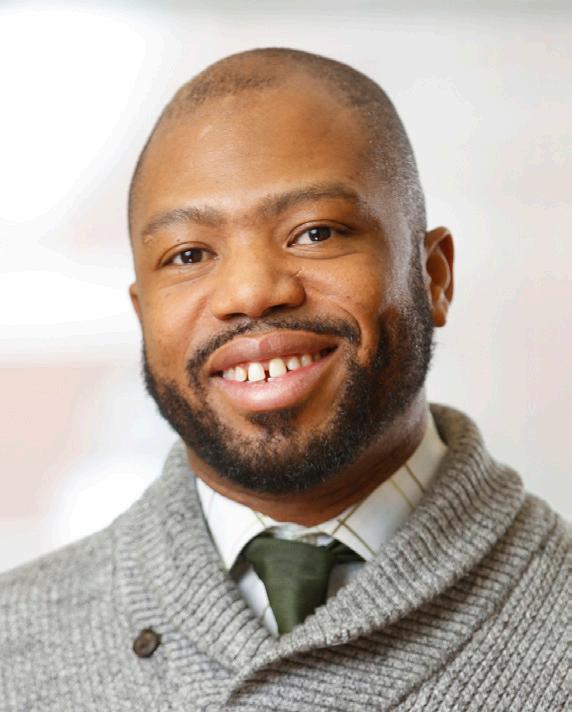
Humanitarian Award Megan Reynolds, ’19N
See story beginning on page 25.
Legacy Award The Karch Family
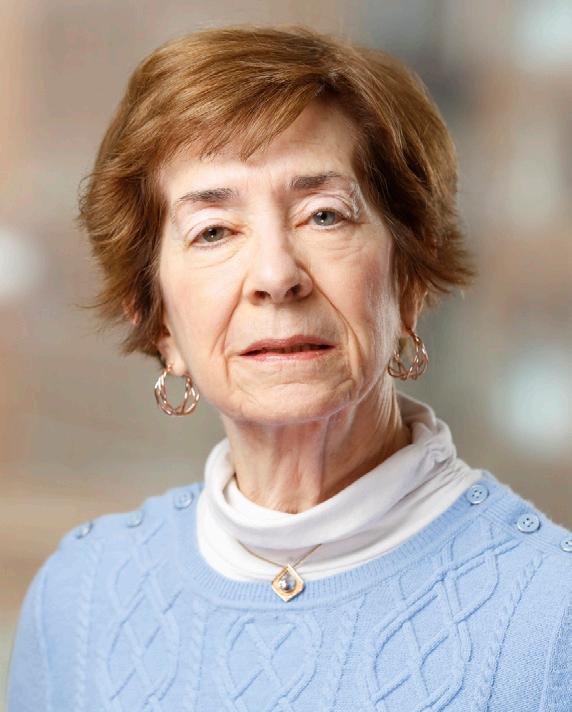
Amy Karch, MS, RN, was a beloved SON faculty member whose teaching career spanned five decades. As associate professor of clinical nursing, she taught one of SON’s largest and most substantive courses, pathophysiology and pharmacology, and taught thousands of students in both the undergraduate and graduate programs throughout
her time at the SON.
Karch authored two nursing pharmacology textbooks—Focus on Nursing Pharmacology and Lippincott Nursing Drug Guide— that are used by nursing educators across the country. She was also a regular contributing columnist to The American Journal of Nursing. Karch was a member of the National League of Nursing, the American Nurses Association, the American Association of Critical-Care Nurses, and Sigma Theta Tau.
In 2004, Karch was recognized by SON with the Dean’s Award for Excellence in Teaching and the Faculty Hero Award. She received Strong Memorial Hospital’s M.E. Clark Pioneer in Nursing Award in 2009 and the Josephine Craytor Education Award in 2012. Additionally, she was twice awarded a National Institutes of Health (NIH) federal nurse traineeship and received the Nurse Scholar Award from the American Nurses’ Foundation.
Karch passed away in 2019. As a tribute to her commitment to SON and the nursing profession, her children, Timothy, Mark, Cortney, and Kathryn, established the Amy Karch Memorial Scholarship Fund to provide scholarship support to nursing students. Karch’s vital impact lives on through her family including her children and ten grandchildren.
Legacy Award The Andolina Family
Elaine Andolina, MS, RN,
was an adored SON educator, mentor, and friend. For nearly 20 years, she was the director of admissions at SON, leading recruitment efforts and welcoming prospective students. Andolina began her career at SON in 1996, serving as an admissions counselor and recruitment coordinator. In 1999, she joined the teaching faculty and was named director of admissions. In 2005, she was promoted to assistant professor. In 2007, Andolina co-directed the Accelerated
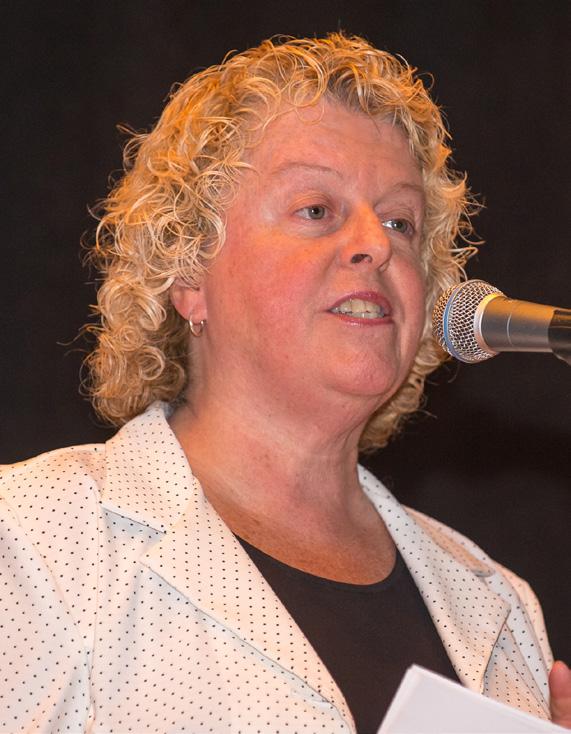
Programs for Non-Nurses and helped to significantly increase enrollment at SON.
Andolina earned a bachelor of science in nursing from Georgetown University and a master of science in nursing from SON. In 2013, Andolina received the SON Professional Advancement Award. In 2014, the American Association of Colleges of Nursing presented her with their Graduate Nursing Admissions Professionals Annual Award for Extraordinary Service. She received the Leadership Award from the New York Organization of Nurse Executives, the SON Faculty Hero Award, and the GEM Mentor Award from the U.S. Department of Labor.
Andolina passed away in 2019. As a tribute to her dedication, the Elaine Andolina Memorial Scholarship Fund was established to provide scholarship support to nursing students. Andolina’s contributions to SON live on through her family including her husband, Dr. John R. Andolina, children, Jeffrey, Mark, and Carrie, and 12 grandchildren.
Dean’s Medal (2019) Harriet Kitzman, PhD, RN, FAAN
An internationally celebrated and accomplished researcher, nurse, and mentor,
Harriet Kitzman, PhD, RN,
FAAN, was awarded the Dean’s Medal before passing away in March 2020. Kitzman developed the pediatric nurse practitioner program at the University of Rochester and was the first clinical chief/chair responsible for nursing services in the University of Rochester Medical Center and nursing education and research within the UR School of Nursing. Kitzman was also one of the key drivers in the development of the Unification Model.
From her early years of research, Kitzman’s investigations had been related to the effects of nurse home visitations for firsttime mothers and children with a prominent focus on economically disadvantaged families.
Over a 30-year research period, Kitzman found that nurse visits lead to healthier pregnancies, improve the health and development of children, and help at-risk families improve their self-sufficiency. Her findings had a significant impact on both individual care and health care policy, which received national recognition through the Nurse Family Partnership National Service Office and American Academy of Nursing's Edge-Runner Programs, and now serves more than 30,000 families in 42 states.
Kitzman earned a vast number of awards and accolades over her 45 years of service to the UR School of Nursing including the Rochester Business Journal Health Care Achievement award and the University Award for Lifetime Achievement in Graduate Education. She held graduate degrees from the University of Rochester and the esteemed Loretta C. Ford Professorship.
Dean’s Medal (2020)
Patricia A. Chiverton, ’80N (MS), ’91W (EdD)

Patricia Chiverton, EdD, RN, FNAP, a national leader in higher education and a recognized expert in nursing entrepreneurship, was awarded the 2020 Dean's Medal. Chiverton also served as dean and professor of UR School of Nursing and vice president of Strong Health Nursing. Under Chiverton’s leadership as the dean, UR School of Nursing added many new and enhanced educational programs, completed a successful $20 million capital campaign, and constructed a new education wing. Chiverton also advanced the UR School of Nursing’s National Institutes of Health ranking
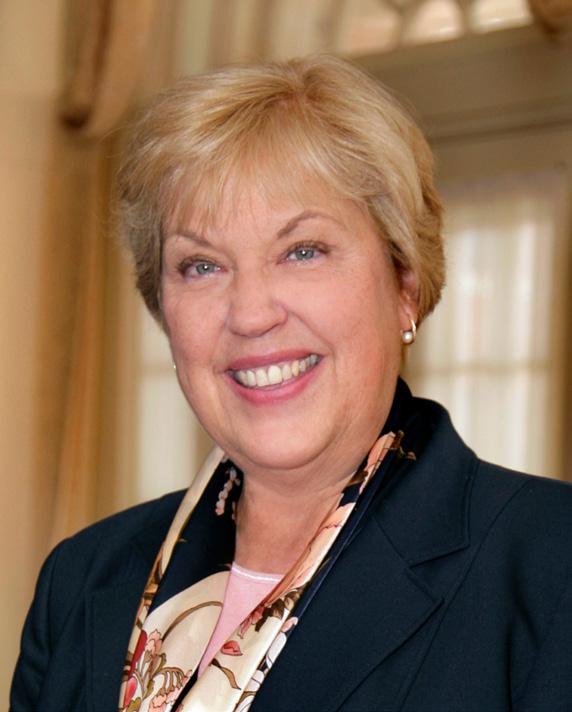
among national nursing schools.
Chiverton’s unique sense of entrepreneurship led to the development of the Center for Nursing Entrepreneurship to cultivate businesses and services to fill niches in the health care market and foster new opportunities for nursing professionals.
Chiverton’s academic work has been published in more than 20 national peer-reviewed journals, and recognized through numerous awards. She was named a Fellow of the National Academy of Practice and received the Excellence in Leadership Award from the American Psychiatric Nurses Association.
John N. Wilder Award The Patrick P. Lee Foundation
The Wilder Award honors an individual, family, corporation or foundation for philanthropic leadership which inspires an “Ever Better” world. The award was given to the Patrick P. Lee Foundation, which created a scholarship for students from Western New York to earn a psychiatric nurse practitioner degree at the UR School of Nursing.
As a means to decrease the mental health professional shortage, the scholarship expands access to the UR School of Nursing’s online Family Psychiatric Mental Health Nurse Practitioner program to individuals from more rural parts of the Western New York region who wish to pursue mental health degrees while remaining in their communities.
A philanthropist at heart, Patrick P. Lee’s passion for education and mental health have earned several awards: Philanthropist of the Year by Association of Fundraising Professionals of the Western New York Chapter; induction into St. Louis University’s Smurfit-Stone Entrepreneurial Alumni Hall of Fame, and later, the Alumni Merit Award; and the Horatio Alger Award given by the Association of Distinguished Americans for individuals who demonstrate personal initiative, leadership, and the importance of higher education.






